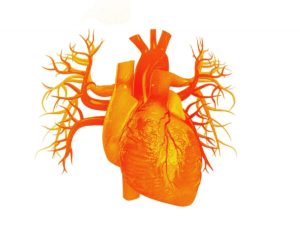Cardiovascular Disease
Build Up to High-Intensity Training
In light of increased participation in high-intensity training and increased rates of heart attack and sudden cardiac death among male marathon participants, the American Heart Association has issued a scientific statement to outline the benefits and risks of vigorous exercise programs.
Active Commuting Linked to Heart Health
University of Leeds researchers in England found an association between heart health and active commuting among data for 43 million British working adults ages 25–74.
Recreational Running and Type 2 Diabetes
Here’s more support for the benefits of recreational running. Data analysis from more than 19,000 male and female adults over an average of 6.5 years showed that leisure-time running was linked with a reduced risk of developing type 2 diabetes.
Some Physical Activity May Not Benefit Heart Health
Resistance training may reduce fat levels around the heart (above), but not all strength-based activities are beneficial for cardiovascular health. New research shows that occupational activities like routinely carrying heavy loads at work may have a negative impact on the heart.
Strength Training Reduces Heart Fat
Location matters with body fat. The accumulation of excess fat around the heart can increase the risk of cardiovascular disease. A new study by researchers at the University of Copenhagen in Denmark assigned participants to resistance training, high-intensity interval endurance training (HIIT) or no exercise. Results showed that only people who lifted weights decreased the fat lying closest to the heart—specifically, inside the sac that encases the heart (the pericardium).
Exercise and Longevity for Women
A new study further supports the benefits of maintaining cardiovascular fitness during middle-age and beyond. In a study presented at the European Society of Cardiology’s EuroEcho 2019 meeting in Vienna, high cardiovascular fitness was linked with significantly lower death risks from heart disease, cancer and other causes for middle-aged and older women.
More Benefits for Fit Kids
Heart health is not simply about having a strong heart muscle; a healthy cardiovascular system requires a healthy nervous system that regulates the heartbeat and supports efficient functioning whether a person is feeling calm or stressed. A new study from Finland shows that more physically active and fit children have better cardiac regulation than those who are less active and less fit.
Aquatic Walking Benefits
Water exercise is a great alternative to treadmill or outdoor walking for people who experience discomfort when training on land.
Men’s Health Research Review
Men: Are you exercising and eating healthfully but not losing the weight you want? The good news is that there are more benefits to these two habits than just weight loss.
Megan Senger, professional fitness writer/editor and fitness instructor based in North Carolina, has summarized a few studies that center on men’s wellness, with comments on what the findings may mean for you.
Advice on Salt Targets Heart Disease
While sodium is rampant in fast food, pizza and deli items, it can also be hiding in surprising amounts in everything from bread to ketchup to cereal. As a result, the average sodium intake of Americans is about 3,400 milligrams daily, mainly from commercial sources like restaurant meals and packaged foods. The latest advice on limiting salt intake comes in a new report released by the National Academies of Sciences, Engineering, and Medicine that ties lower sodium intake to less risk of chronic disease.
Evening Cardio Training and Hypertension
In another clinical trial examining the impact of time of day on training effects, researchers found that cycling at moderate intensity for 45 minutes three times per week in the evening decreased clinical and ambulatory blood pressure in 50 middle-aged sedentary men with hypertension more than either morning training or stretching (the control group).
Plant-Based Diets Can Help Reduce Heart Failure Risk
Plant-based diets are associated with a lower risk of heart failure in adults without known heart disease, while Southern diets consisting of more fried and processed foods and sweetened drinks are associated with greater risk, according to a study published in the Journal of the American College of Cardiology (2019; 73, [16], April 30). The study looked at the association between five dietary patterns and risk of heart failure.
Pushups and Heart Health
Active middle-aged men who were able to do more than 40 pushups had a significantly lower risk of heart disease events during a 10-year follow-up period than men who could do fewer than 10 pushups, according to a study reported in JAMA Network Open (2019; doi:10.1001/jamanetworkopen.2018.8341).
More Long-Term Aerobic Fitness Benefits
New research adds to growing evidence that current cardiovascular fitness levels affect heart disease risks as far ahead as 9 years in the future. “Even among people who seem to be healthy, the top 25% of the most fit individuals actually have only half as high a risk [of heart disease] as the least fit 25%,” said principal investigator Bjarne Nes, PhD, of the Norwegian University of Science and Technology, Trondheim, Norway.
Debating Alcohol Consumption and Risk
In our September 2018 issue of Fitness Journal, we reported on an international study published in The Lancet that found any level of drinking above 100 grams of alcohol (3.75 ounces) per week increases heart disease risk and shortens lifespan.
Resistance Exercise and Heart Health
“People may think they need to spend a lot of time lifting weights, but just two sets of bench presses that take less than 5 minutes could be effective [in reducing heart disease risks], according to study author DC Lee, PhD, associate professor of kinesiology at Iowa State University, Ames.
Researchers analyzed data collected over 19 years from more than 12,000 male and female adult participants in The Aerobics Center Longitudinal Study conducted at the Cooper Clinic™ in Dallas.
Exercise Program Can Restore Heart Muscle Health
Good news for people who have delayed starting a training program. If the following exercise regimen is begun before age 65, studies show that the heart muscle can regain elasticity, reversing stiffening that can develop from lack of physical activity. Cardiologists from the University of Texas Southwestern Medical Center and Texas Health Resources in Dallas have been studying how to promote health and elasticity of the heart muscle.
Does Sodium Intake Concern You?
Salt: Enemy of the heart or wrongly convicted?
For years, health experts have been beating us over the head about the importance of scaling back our salt intake for the sake of our heart health. Based on research findings, the World Health Organization recommends a daily consumption of less than 2,000 milligrams of sodium—one teaspoon of salt—as a preventive measure against cardiovascular disease. The American Heart Association is even stingier with the salt shaker—just 1,500 mg of sodium a day for individuals at risk of heart disease.
What A PURE Diet Looks Like
Perhaps a heart-healthy diet has room for steak, after all.
Boosting the Brain Health of Older Adults
Exercise is good for promoting brain health. Indeed, the right kind of exercise can protect against the natural decline of brain.



















